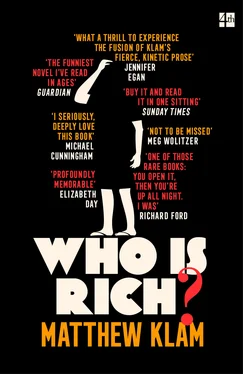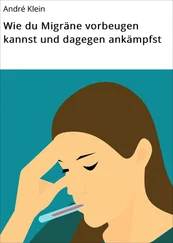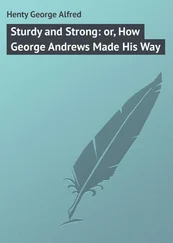On second thought, I felt scummy and rejected and ashamed. Worse-looking every day, I had a cartoonist’s body: shoulders hiked up, head hung forward, face drooping, fuzzy gray hairs coming in on the sides, yellow toenails, my potbelly blousing my T-shirt, forcing me to suck in my gut, to fight the constant hunger of a tired middle-aged man. To be ugly in such a beautiful place was worse, among the shifting sands and rotting kelp and hopeless erosion.
The baseball field was at the far end of campus, inland, breezeless, and hot. You could smell fertilizer baking in the dirt. I watched an airplane fly along the bay towing a Geico banner.
Carl, the director, came across the field, lugging a duffel bag full of bats. He dropped it and jogged around the infield, ass bouncing, change jingling in his pockets, throwing bases on the ground. Then he sat, sweating heavily, on the other side of Tom and told us how much the bag of bats weighed, and where he’d lugged it from, and how an intern named Megan Donahue had locked the keys in the shuttle bus and the cops were on the way, and how the stage in the theater building had been shellacked two weeks ago but according to the theater people was still tacky, so the actors had to act in their socks so they didn’t stick to the floor. And the playwrights were all assholes. You had to call them “theater artists” or the “Drama Department” or they got angry. Then he pushed his long gray hair out of his face and went through the faculty, listing who was a piece of crap; anybody demanding a room change or failing to address students’ needs qualified, and this year, some of the new teachers seemed to be showing up with dietary restrictions or three names, like Alicia Hernandez Roulet. And the poets pronounced it “poe-eh-tray.” If it wasn’t for nice guys like Tom and me, he’d quit.
There was a certain headache you got after a day or so, the conference headache, which Carl already had. After three days you got a certain taste in your mouth, conference tongue. He told us how the administrators at the state U had lied and screwed him on funding, they were nickel-and-diming him to death, he had booze in his car that he’d stolen from Marine Bio and Sustainability—then we were quiet there on the dugout bench, and Carl asked Tom how much they paid him at other summer conferences. Tom laughed and said he never left the house for less than five grand but made an exception for this, since we had parties in the windmill.
More people straggled across the field; they seemed fine with the heat, pulling bats out of the duffel bag, dumping the bag to find helmets, testing swings, throwing and catching. Stan, a poet, claimed the mound to calibrate his underhand lob. An old lady with knee braces waited at the plate for batting practice. A security guard stood along the fence, and two women in beach clothes and visors sat in the stands. An able-bodied kid passed in front of the dugout, shirtless, barefoot, wearing jeans that had been shredded below the knee like a castaway’s—a fundamentally beautiful young person, covered in downy golden peach fuzz, handing out bottles of water.
A couple of conference-goers in bikinis sat on towels on the third-base line in front of the other dugout, and the able-bodied kid went over and gave them water, then spilled water on them and they screamed. He ran but they chased him and pulled him to the ground and pinned him and poured water on him. Everybody was having fun.
They were perfect and beautiful, whereas I was already a little revolting, although better straight on, but worse from the side. I was forty-two years old, obstructed by the limits of love, grasping at lust, scared to work on a crumbling marriage I’d be sure to hang on to for whatever remaining time we had here on earth.
A young woman dug through the mitts beside me and kept flapping them open and closed until I told her that a righty wears the thing on her left hand. I got a ball and went out onto the grass and showed her how to throw and catch. Her name was Eva Rotmensch. Some people pronounced it “Ava,” she said, but they were wrong. She walked with turned-out feet and had a flat pale face with a sharp jawbone and bluntly cut hair. She wore a cropped white blouse and pink shorts so fitted and tiny it would be difficult to imagine any underpants surviving inside them. When she raised her arms, her shirt went with them and I saw her thin torso. She needed me to know that she belonged to the theater company, as opposed to the theater workshop. Never played softball before, no sports, spent the first twenty years of her life in a dance studio. She pranced around on long, strong legs, like she was still onstage, mimicking my exaggerated throwing motion, elbow back, above her ear, and threw it over my head, then threw it into the bushes, then under the stands, waiting each time for me to go get it, like my daughter, who didn’t know how to do anything and needed me to show her, as though she were doing me a favor, turning whatever should’ve been fun into a pain in the ass.
I asked polite questions about her acting career, and mentioned a few out-of-the-way spots where people go to sunbathe, smiling at her, wondering whether she liked the beach, whether she liked swimming in big waves, feeling invisible and ignored, wondering what it would be like if for some reason she put down the mitt and lay on the grass and pulled down her shorts and begged me to fuck her.
Art historian Marilyn Michnick sat behind the fence, smiling and serene, and nearly blind, needing a cane, beside Alicia Hernandez Roulet, whose ugly little walleyed dog yapped around the field. Mohammad Khan, a theater critic, cleaned his eyeglasses with long, delicate-looking fingers, complaining about having to play. “I don’t like to get sweaty. I don’t like to be wet.” Vicky Capodanno came toward us from right field, in the baggy black T-shirt and shorts and combat boots she wore every year for softball, and a few steps behind her, Tabitha wore a baseball cap and a long thing you toss over a bathing suit that looked like a tablecloth. I recognized a couple stragglers, among them a taller lady moving stiffly, hunched and broad-shouldered in her gray sleeveless T-shirt and blue-and-green plaid shorts, who I’d spoken to a few minutes earlier: Amy O’Donnell, who I’d once held as we caressed in the dark, trembling and naked, and later while sleeping in the quiet dawn. I wanted another moment with her, something I could look back on later, to get me through another year, a scene, a place to park my soul through winter months of diapers and screaming.
I looked across the road, beyond the trees, to houses and a cornfield in the distance. Whatever hadn’t been watered was dead. A guy in a jungle hat took batting practice, drilling balls into left field, where eight or nine people stood chatting in two clumps, some of them not even facing the batter, and I wondered if one of them would be hit by a ball and killed.
Amy went behind the dugout and started stretching, some kind of hurried knee-bend squat. She was so tall. Her people could be traced back to the northern coast of Ireland, where shipwrecked Vikings raped the villagers, which made them tall and fair. She bent, she hunched, she made horrible faces. Now she squatted side to side.
The guy with the water came through the trees from the parking lot, and one of the girls in a bikini tried to make a run for it, shrieking, and he tackled her and spilled water on her and she screamed. They were young, although not so young, but like a different species.
“What’s his problem?” I asked Eva. “Why isn’t he playing?”
She watched him, lips parted, not smiling. She said his name was Ryan.
“Is he in the theater company?”
“He’s in something in New York, so he’s going back and forth, taking the train, so he can’t be in anything here.”
Читать дальше












